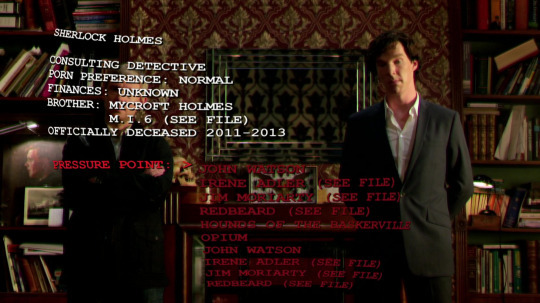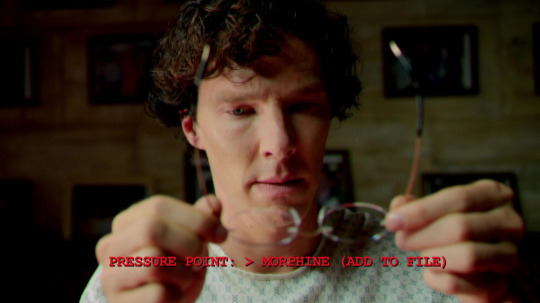okayokay i just had a question about mary cause i was watching HLV again and who better to ask that you? So magnussen supposedly texted mary with the skipcode right?and i was thinking- WHY did he text mary and not sherlock? Mary obvs knew it was a skipcode
(2) you totally knew this already but i thought about it and flipped out so i need someone to freak out with. haha anyway- happy halloween
What an excellent question!!
Maybe Magnussen was indeed testing their pressure points! Though if he was, it wouldn’t explain entirely why he was still searching for Sherlock’s primary pressure point earlier in HLV. In his very first deduction of Sherlock, he does list John as the top one, but then scrolls repeatedly through other possibilities. They go in the order of: John, Irene, Moriarty, Redbeard, Hounds of the Baskerville (are they missing an S here??), and opium (aka drugs in general).

Let’s just look at those.
John: this is obvious. Best friend, only real known exception to Sherlock’s overall scorn for human interaction in general. Would Magnussen have known about the snipers and the fact that Sherlock was willing to jump off a building rather than see John shot? We don’t know. But clearly John is important to Sherlock, enough so that he wouldn’t think twice about hijacking someone’s motorcycle and throwing himself head first into a bonfire - and that’s when they weren’t even on speaking terms yet! This makes for a strong first candidate. Why the other possibilities, then?
Irene: known employee of James Moriarty. Irene would therefore be a candidate in terms of an opponent, the way Moriarty is. How much does Magnussen know about Irene’s interactions with Sherlock? Does he think of her as a romantic weak spot? Not likely. Remember that Magnussen almost certainly wouldn’t have known about Sherlock having rescued Irene. That’s a whole other discussion, but to me that was an act of mercy on Sherlock’s part. He won in the “game” against Irene, but that didn’t mean he necessarily thought she had to die. Does Magnussen know that Sherlock won the game? For me, the only way in which Irene has any influence over Sherlock is to remind him that his body is more than transport, and that she knows for whom he would weaken. (Hint: it’s not her.)
Moriarty: known enemy of Sherlock. We saw in HOB that when Sherlock was drugged and frightened, the first face he saw was Moriarty’s and he reacted not in a spirit of banter as he would have with Moriarty’s subordinate, but with genuine fear. When Sherlock is fighting against his own death and descends to the bottom of the pit of his own mind, Moriarty is the personification of everything that Sherlock dislikes and fears most about himself. The temptation to give in to death (”you’re gonna love being dead, Sherlock”, “just die already”, etc), to stop fighting. The mocking reminder that in dying, he will have failed John. That, for the audience, should be the first clue that Moriarty himself could not be the ultimate pressure point, when a semblance of Moriarty himself is using John to bait Sherlock.
The Hound (?) of the Baskerville. This is a curious one. Is this just a reference to the mind-controlling, fear-inducing drug Sherlock ran into at the military base? I’m inclined to think it is. Losing control, then, would be the real pressure point. Losing control without having chosen to do so, unlike…
Opium. Magnussen knows that Sherlock uses, or has used. In my view, this is at least half the point of his feigned relationship with Janine. She knows that he often doesn’t spend the night at home, that he is “working”, which always results in him coming home dressed like “Shezza” and needing to take long baths because of how dirty he is. Was Sherlock coming home high every time? I’m inclined to think not, specifically because he was indeed trying to control the situation and have Janine think that he was. I also think that it’s no accident that Sherlock was in the same drug den as John’s neighbour’s kid, and that he entirely intended John to find him there, high, leading him back to Baker Street where they would potentially have a fight about it in Janine’s hearing. Feel free to disagree with my interpretation, but it’s very much my feeling that Sherlock was actively trying to get Magnussen to think that opium was indeed his real pressure point, leading him away from John.
I wonder what effect Magnussen’s visit to Sherlock in the hospital had, in the deleted scene. Did it make Sherlock realise vividly just how dangerous Magnussen was? After all, Magnussen’s visit could certainly be considered sexual assault (as I explore in The Yellow Poppies). Perhaps it made Sherlock all the more determined to keep John out of Magnussen’s slimy reach.
Look at the visit in the restaurant across from the hospital: we see Magnussen come in, then Sherlock deliberately reaches over and turns up his morphine.


Note that the camera focuses specifically on the morphine drip here (rather than the IV bag in the first shot).
He doesn’t ever turn it UP in any other scene that we’ve seen him with the morphine drip. He turns it down in the hospital when Janine is there and he no longer needs to feign a drug habit, since that little ruse is over. He doesn’t even take it with him when he escapes from the hospital to stage the John/Mary revelation. Clearly morphine is not all that important to him.
And it works: in this scene, Magnussen updates his mental file to add morphine, specifically.

All of this could be tied into why Sherlock urged John into staying with Mary, too. I always assumed that it was just a practical measure for John’s own safety with regard to Mary, but perhaps Sherlock was still actively working at leading Magnussen away from John. If he broke ties with Mary for having shot him and insisted that John choose him over the woman who shot him, John’s importance would seemingly go up. If Sherlock acted almost indifferent about Mary’s shot, perhaps it would simply appear to be less of a personal betrayal because John was not all that important to him, after all.
However, Magnussen saw through it, unfortunately. He was a very intelligent man, after all, and a very horrible one. He was the king of blackmail; he was therefore very good at seeing people’s weaknesses. Maybe Sherlock’s willingness to rush head first into a fire without an apparent second thought for his own well-being was simply the most convincing argument, after all. Just my five cents, though. :)
silentauror's Blog
- silentauror's profile
- 9 followers



